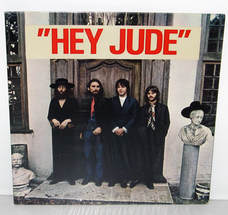 by Julian Spivey Over the last month The Word’s Facebook page followers have been participating in a ‘Greatest ‘60s Songs’ tournament and recently “Hey Jude” by The Beatles won the tournament as the greatest song of the 1960s in a close matchup against “House of the Rising Sun” by The Animals in a true battle of the British Invasion bands. “Hey Jude” is one of those perfect sing-along songs that seemingly everybody knows all of the lyrics to and everybody likes to rock out to in the long (after many listens maybe too long) coda with all the “na na na nas.” If you’ve ever been in a packed arena with McCartney singing it and the crowd screaming along, as I’ve had the great experience of doing, it’s truly one of those magical musical moments. I think most well-informed music lovers even know the story behind the song, at least partially, in that it was written by Paul McCartney for John Lennon’s oldest son, Julian, during a hard time in young Julian’s life when John was separating with his first wife Cynthia after an affair with future wife Yoko Ono. For a family-friend and bandmate of his father it showed an awful lot of caring on McCartney’s part to compose such a song, that would become The Beatles high-selling single and eventually an all-time classic known worldwide. One month after John and Cynthia separated, Paul drove to meet Cynthia and Julian with the purpose of delivering them one single rose. McCartney would later tell writer Barry Myles that he found it “a bit much for them [Cynthia and Julian] suddenly to be personae non gratae and out of my life,” after all Cynthia had been a part of The Beatles social circle since before they hit it big. During this car ride to visit Cynthia and Julian, McCartney was thinking about 5-year old Julian and his uncertain future and the struggle of divorce on a young child and began singing the words “Hey Julian” with other lyrics about comforting and reassuring him improvised throughout. It wouldn’t take long for “Hey Julian” to turn into the less syllabic “Hey Jules” and “Hey Jules, don’t make it bad, take a sad song and make it better” – which would become the opening line to “Hey Jude” flowed out. The song title would be changed during the fleshing out of the lyrics because Paul thought it to be a stronger name. According to Steve Turner’s The Beatles: A Hard Day’s Write, the song – though written for Julian – would be confused by John as being about him and encouraging him to make a break from his family and start a new future with Yoko. McCartney would also end up feeling the song as much about himself and the ending of old bonds within the band as reassuring himself that everything would be OK. Julian has known for most of his life that “Hey Jude” was written about and for him and admitted that at an early age he had a closer relationship to McCartney than his own father. “We had a great friendship going and there seem to be far more pictures of me and Paul playing together at that age than pictures of me and dad,” Julian said. He also said how much the song continues to mean to him. “It surprises me whenever I hear it. It’s very strange to think that someone has written a song about you. It still touches me.” [Turner, 239] “Hey Jude” was released as a single in August of 1968 and it would become the group’s longest serving No. 1 hit in the United States, topping the charts for nine weeks. In 2013, Billboard called it the “10th biggest song of all-time.” In 2001, the National Academy of Recording Arts and Sciences inducted it into the Grammy Hall of Fame. “Hey Jude” was ranked as the eighth greatest song of all-time by Rolling Stone in its 2004 list of the “500 Greatest Songs of All-Time,” making it the highest ranking Beatles song on that list. Uniquely enough The Word’s Facebook page previously held a greatest Beatles song tournament and “Hey Jude” was not the winner, but rather 1967’s “A Day in the Life,” which lost in the Final Four of the “Greatest ‘60s Songs Tournament” to “House of the Rising Sun” by The Animals.
0 Comments
Leave a Reply. |
Archives
April 2024
|